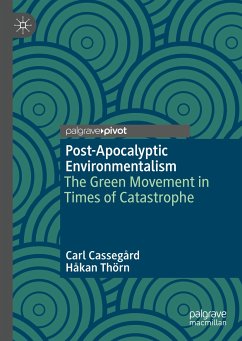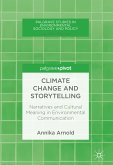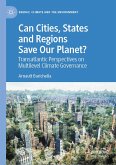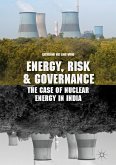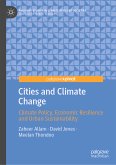"The book will make a timely and essential contribution".
- Ron Eyerman, Yale University, USA
"In this book Cassegård and Thörn announce the moment of a new form of environmentalism that confronts systems of denial and responds to inescapable ecological destruction. With sociological sophistication and critical insight, the authors break new ground and open up an important research agenda for scholars of environmental activism".
- Eva Lövbrand, Linköping University, Sweden
"The book makes an original contribution. There have been books on the history of environmentalism, but none that focuses on the post-apocalyptic elements of it. It will also contribute with conceptual clarification on these narratives within green political theory".
- Frida Buhre, Linköping University, Sweden
This book analyses how the environmental movement has developed three overarching narratives that co-existand compete within it. The first is the narrative of green progress, which has been prominent from the start in environmentalist thought and which is today expressed in the idea of sustainable development and in eco-modernism. The second is the apocalyptic narrative, which urges us to act in order to avert a future catastrophe and which rose to prominence with Rachel Carson and other classics of post-war environmentalism and experienced a renaissance with the climate activism of the 2000s. The third is the postapocalyptic narrative according to which catastrophe is already an unavoidable fact. The centrepiece of the book is its discussion of the postapocalyptic narrative, which has become influential in the recent decade, especially in the wake of the disillusionment following the failed climate summit in Copenhagen 2009.
Climate change, resource exhaustion, pollution and species extinction signal that catastrophes have already become realities here and now for an enormousnumber of people and other lifeforms. The book probes the possibilities and limitations of the environmental movement in grappling with these issues and turning them into relevant action.
Carl Cassegård is Professor of Sociology at the University of Gothenburg, Sweden.
Håkan Thörn is Professor of Sociology at the University of Gothenburg, Sweden.
- Ron Eyerman, Yale University, USA
"In this book Cassegård and Thörn announce the moment of a new form of environmentalism that confronts systems of denial and responds to inescapable ecological destruction. With sociological sophistication and critical insight, the authors break new ground and open up an important research agenda for scholars of environmental activism".
- Eva Lövbrand, Linköping University, Sweden
"The book makes an original contribution. There have been books on the history of environmentalism, but none that focuses on the post-apocalyptic elements of it. It will also contribute with conceptual clarification on these narratives within green political theory".
- Frida Buhre, Linköping University, Sweden
This book analyses how the environmental movement has developed three overarching narratives that co-existand compete within it. The first is the narrative of green progress, which has been prominent from the start in environmentalist thought and which is today expressed in the idea of sustainable development and in eco-modernism. The second is the apocalyptic narrative, which urges us to act in order to avert a future catastrophe and which rose to prominence with Rachel Carson and other classics of post-war environmentalism and experienced a renaissance with the climate activism of the 2000s. The third is the postapocalyptic narrative according to which catastrophe is already an unavoidable fact. The centrepiece of the book is its discussion of the postapocalyptic narrative, which has become influential in the recent decade, especially in the wake of the disillusionment following the failed climate summit in Copenhagen 2009.
Climate change, resource exhaustion, pollution and species extinction signal that catastrophes have already become realities here and now for an enormousnumber of people and other lifeforms. The book probes the possibilities and limitations of the environmental movement in grappling with these issues and turning them into relevant action.
Carl Cassegård is Professor of Sociology at the University of Gothenburg, Sweden.
Håkan Thörn is Professor of Sociology at the University of Gothenburg, Sweden.
Dieser Download kann aus rechtlichen Gründen nur mit Rechnungsadresse in A, B, BG, CY, CZ, D, DK, EW, E, FIN, F, GR, HR, H, IRL, I, LT, L, LR, M, NL, PL, P, R, S, SLO, SK ausgeliefert werden.
Es gelten unsere Allgemeinen Geschäftsbedingungen: www.buecher.de/agb
Impressum
www.buecher.de ist ein Internetauftritt der buecher.de internetstores GmbH
Geschäftsführung: Monica Sawhney | Roland Kölbl | Günter Hilger
Sitz der Gesellschaft: Batheyer Straße 115 - 117, 58099 Hagen
Postanschrift: Bürgermeister-Wegele-Str. 12, 86167 Augsburg
Amtsgericht Hagen HRB 13257
Steuernummer: 321/5800/1497
USt-IdNr: DE450055826
Bitte wählen Sie Ihr Anliegen aus.
Rechnungen
Retourenschein anfordern
Bestellstatus
Storno

